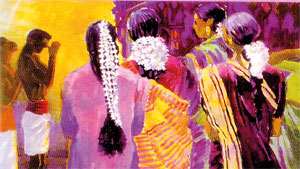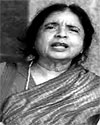A poet’s search for meaning amidst the ruins
View(s):Cogito Ergo Sum – Descartes – I think therefore I am! It is by pausing our lives and looking at the past, not necessarily our own, but histories which have produced our generation, that we could fully realize who we are, why we got here, what we could do better with our lives and come to terms with the people we are linked to. Jean Arasanayagam with her characteristic candour takes a trip through scenes of her past and that of her ancestors in verse – something which comes so naturally to her. The pearls of wisdom flow so mellifluously that you are transported to the scenes of triumph, disaster and reawakening, so realistically that you cannot shake yourself out of the trance induced in you.
 Jean Arasanayagam has been internationally recognized and the accolades she has received are so well known that it is superfluous to mention them. She commenced her publications with a book of poems in 1973 and the collection of short stories, ‘The Cry of the Kite’. Since then we have been treated to almost an avalanche of stories, poems and learned writings which should by now have stirred us out of our apathy and made us take notice of what she sees as responsible, noble, human behaviour.
Jean Arasanayagam has been internationally recognized and the accolades she has received are so well known that it is superfluous to mention them. She commenced her publications with a book of poems in 1973 and the collection of short stories, ‘The Cry of the Kite’. Since then we have been treated to almost an avalanche of stories, poems and learned writings which should by now have stirred us out of our apathy and made us take notice of what she sees as responsible, noble, human behaviour.
I am proud to relate how I came to write this review. Jean Arasanayagam was a young graduate struggling to control a class of boys at St Anthony’s College, Kandy, in the early sixties when I first encountered her. She was my English teacher, so it is with great respect and some trepidation that I review her work.
To go back to the thought of “I think therefore I am”, Jean Arasanayagam in this work embarks on a voyage to locations in the country where her ancestors and the ancestors of her husband lived and died, which also means that we are treated to a rare account of some history which makes us ponder of times gone by and people who made history for us, some good and some not so good. As much as Jean is in her inimitable style hard on people who have been insensitive and callous, she breathes in positive thoughts which could make us as those who have gained, or been set back by history, to think of what lessons we could take for making a future for ourselves. Deep down, her strong spiritual commitment and faith are expressed very vividly.
The book is presented in Two Preludes, a Journey North and the Return to Navaly and the poems are accompanied by some information of historical and explanatory value. Jean has not held back in expressing her innermost feelings. Her personal anguish, pain she has been put through, the affronts and insults, have been borne in such manner that it has only resulted in more impassioned writing which makes us ashamed of what has happened in the past and to look for spiritual help to be better human beings in the future. She thinks and her thoughts make her who she is – a voice calling for repentance and a rebirth within this lifetime which is fleeting for many of us. She may have been a voice in the wilderness earlier, but not so now, with a more enlightened society seeking reconciliation.

Jean Arasanayagam
Her current work takes a theme from a painting of George Beven and her interpretation of the painting is sublime. It illustrates that all supplicants before the Gods are treated equally. What we as humans usually resort to is to label people and dissociate ourselves from those who do not have a label which fits our personal likes. Everyone is equal in the eyes of the Gods and the women depicted in the painting and the poems are all resplendent in their finery and offer their prayers and supplications following tradition. I was reminded of the Fiddler on the Roof and the hero of the film saying that we are all fiddlers on the roof, doing what one is forced to do which is fraught with danger and nevertheless we do it because of “tradition”. Spiritual tradition is what could give our otherwise individualistic, selfish existence the gum to bond together as one with those whom we excluded from our consideration before.
The whole book as said earlier brings together visits to interesting places rich with history and tradition, and the verses captivate you and send you on a journey into the past, making you question what it was all about in terms of the grandeur of the times and what has now been left behind both in terms of mighty edifices and the people who will always remain uncertain of what strains and genes they carry! The chapter with the title of “Identity Search” deals with the Fort at Jaffnapatam in 2014 and the thoughts evoked by the visit. The sanctimonious and obstinate clutching on to questionable antecedents make one wince, and of course, concede the stark truth.
The maritime forts of the 16th, 17th and 18th Centuries are part of her exposition of what the country really benefitted and lost. She paints quite vividly the lifestyles, desires and feelings of the invaders and the complexities of their wants. It is remarkable how she brings to life the ancestors who lived in those days.
In prelude 2, the author tells us that from the time she was a schoolgirl she has explored Jaffna and it does not seem an accident that she married a Tamil from Navaly. She pays homage to Guru Yogasamy.
The poems show the deep concern the writer has for establishing peace and harmony and the need for making our diversity which can be an asset, work for us.Having felt that she was misunderstood for many years, she sums up her personal goal as: “the freedom and liberation to be myself and to live with truth and integrity, without bias and prejudice, without rancor, bitterness or hostility towards any being”. Her writings are very expressive and her words of wisdom in relation to eschewing our prejudices which divide and reaching out to those who are on the other side of the divide as being no different to us need to enter into our personal ethos. In the verses dedicated to an Old Colonial Mansion, one sees these lines which convey a special message: “ No one will ever return to restore these anomalies of history in the impressionistic architecture borrowed from the golden age of classical cultures, it’s we who are left, time’s malingerers who have survived in the aftermath, to reinvent history, create the post-war reparation and reconciliation out of the bitter aloes of death and violence, search among the ruins for meaning to write a new script for our poetry, our fiction”.


